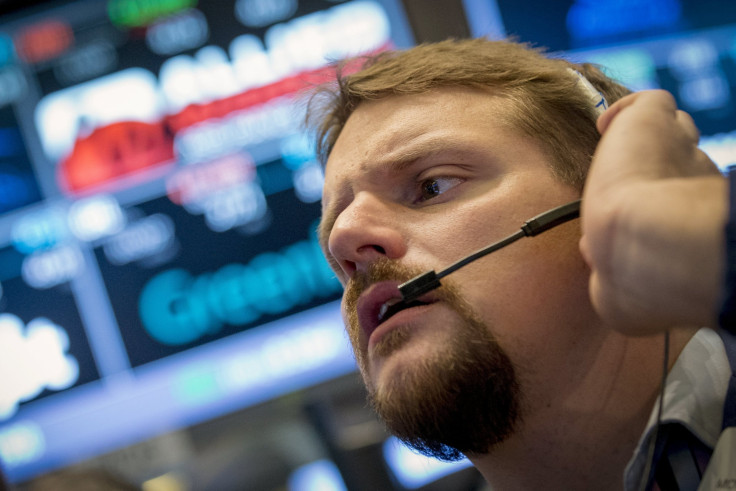Dow Jones Industrial Average Drops After China Stock Market Tumbles 6% On Yuan Fears

UPDATED 4 p.m. EDT
U.S. stocks closed mildly lower Tuesday, with the Dow Jones Industrial Average snapping a three-day winning streak as investors weighed volatility in Chinese stocks ahead of the Federal Reserve’s latest meeting minutes, due out Wednesday.
The Dow Jones Industrial Average (INDEXDJX:.DJI) fell 33.84 points, or 0.19 percent, to close at 17,511.34. The S&P 500 index (INDEXSP:.INX) dipped 5.52 points, or 0.26 percent, to end at 2,096.92. And the Nasdaq composite (INDEXNASDAQ:.IXIC) lost 32.35 points, or 0.64 percent, to finish at 5,059.35.
Macro-economic worries regarding the health of the global recovery continued to dominate investor sentiment this week. “A deeper concern for investors is what China’s growth rate really is and how that affects demand for commodities going forward. That has such an impact on emerging market economies,” said Mike Baele, managing director at U.S. Bank Wealth Management in Portland, Oregon.
Original Story: U.S. stocks traded lower Tuesday after Chinese stocks tumbled more than 6 percent on fears that the world’s second-largest economy would devalue the yuan further to boost slowing growth. Nine of the 10 Standard & Poor's 500 sectors traded lower, led by declines in information technology and materials stocks, while the consumer discretionary sector was the only gainer, up just 0.3 percent.
The Dow Jones Industrial Average (INDEXDJX:.DJI) fell 41.42 points, or 0.24 percent, to 17,503.76. The S&P 500 index (INDEXSP:.INX) dipped 4.44 points, or 0.22 percent, to 2,097.84. And the Nasdaq composite (INDEXNASDAQ:.IXIC) lost 17.87 points, or 0.35 percent, to 5,073.98.
China's benchmark Shanghai composite index plunged 6.1 percent Tuesday to close at its lowest level since Aug. 7 after the yuan declined further against the U.S. dollar. Meanwhile, the blue-chip CSI300, which tracks the largest listed companies in Shanghai and Shenzhen, and the smaller Shenzhen Composite tumbled 6.2 percent and 6.6 percent, respectively.
The sharp losses raised concerns over whether the Chinese government's recent rescue efforts are restoring market confidence.
The People’s Bank of China offered 120 billion yuan ($18.77 billion) worth of seven-day reverse repos Tuesday, which are short-term loans to commercial lenders in the money market. The move marked the largest single cash injection since January 2014, when the central bank offered 150 billion yuan ($23.5 billion).
However, the government did not directly prop up the equity market late in the day, as some investors had expected, which exacerbated the downward pressure in China’s stock market, Stephen Guilfoyle, managing director of New York Stock Exchange floor operations at Deep Value Inc., said in a note Tuesday.
U.S. stocks experienced multiple bouts of volatility last week, with the Dow plunging more than 200 points in intraday trading during two separate occasions after China devalued the yuan by around 2 percent against the U.S. dollar in an effort to revive the world's second-largest economy.
Economists say the global economy faces further weakness as China’s devaluation indicates its economy has moved to lower levels of growth. In fact, Peter Cardillo, chief market economist at Rockwell Global Capital, forecasts the Chinese economy is growing closer to 6.5 percent annually, sharply lower than the country’s growth of 7.4 percent last year, which marked the China's slowest annual pace in 24 years.
“The slippery growth rate complicates the Chinese government’s ability in achieving market reforms. In fact, we think the devaluation is likely to lead to more stimulants propping up exports while internal consumption falters,” Cardillo said in a research note Tuesday.
The volatility comes as investors look ahead to Wednesday’s release of the minutes from the Federal Reserve’s latest meeting. Market professional’s will be analyzing the minutes for further clues as to when the central bank will lift interest rates. Most economists anticipate the Fed will announce raising rates at its next meeting in mid-September, which would mark the first increase in nearly a decade.
Wal-Mart Stores Inc. (NYSE:WMT), which led the Dow lower Tuesday, fell 2.5 percent after the world’s largest retailer posted quarterly earnings that missed forecasts. The company lowered its full-year outlook, citing higher costs from adding worker hours and raising wages.
Home Depot Inc. (NYSE:HD) was the biggest gainer in the blue-chip index, gaining 2 percent after the world’s largest home-improvement retailer turned in earnings and revenue that topped Wall Street forecasts, driven by a recovery in the U.S. housing market.
Separately, data released Tuesday showed groundbreaking on new homes jumped in July to its highest level since late 2007 as U.S. housing starts rose 0.2 percent to 1.206 million at a seasonally adjusted annualized rate, the Commerce Department said Tuesday.
“There is also significant pent-up demand for new homes, as households are once again considering homeownership as the memory of the Great Recession fades,” Stuart Hoffman, chief economist at PNC Financial Services Group, said in a research note.
© Copyright IBTimes 2025. All rights reserved.






















